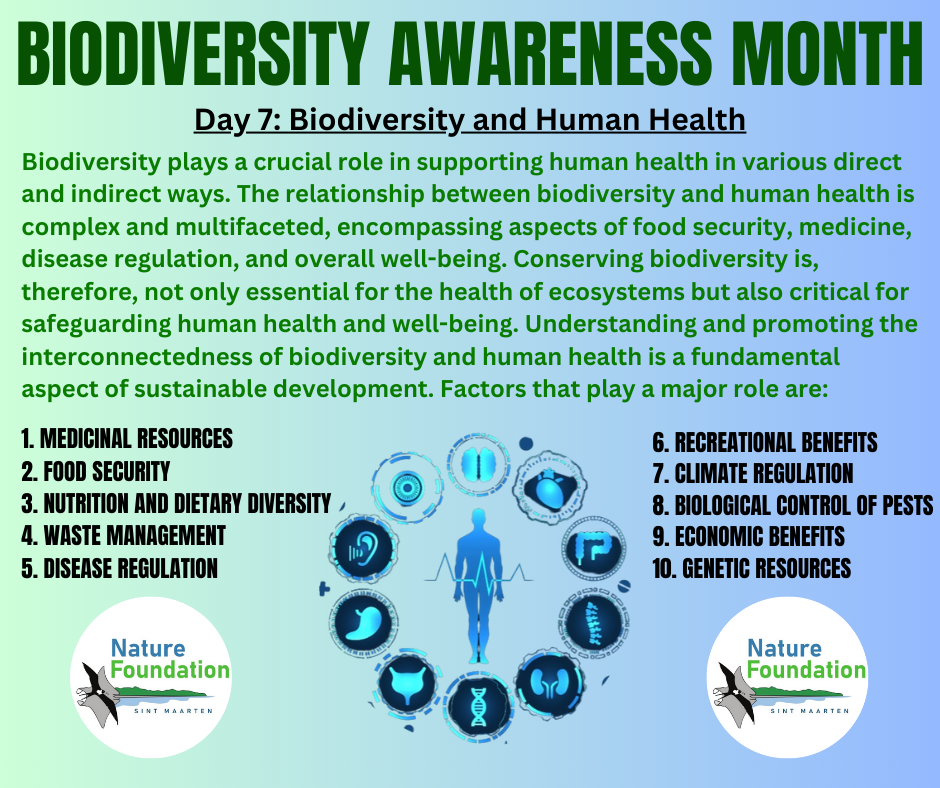Biodiversity month day 7: Biodiversity and human health
Biodiversity plays a crucial role in supporting human health in various direct and indirect ways.
The St. Maarten Hospitality & Trade Association supports the March Biodiversity awareness month organized by the Nature Foundation in an effort to help protect St. Maartens nature and biodiversity. Todays topic: Biodiversity and human health
The relationship between biodiversity and human health is complex and multifaceted, encompassing aspects of food security, medicine, disease regulation, and overall well-being. Here are some key connections between biodiversity and human health:
1. Medicinal Resources:
– Pharmaceuticals: Many medicines and drugs are derived from compounds found in plants, animals, and microorganisms. Biodiversity provides a vast reservoir of potential pharmaceutical resources.
2. Food Security:
– Genetic Diversity in Crops: Biodiversity is essential for maintaining genetic diversity in agricultural crops, making them more resilient to pests, diseases, and changing environmental conditions. This genetic diversity is crucial for ensuring global food security.
3. Nutrition and Dietary Diversity:
– Wild Edible Plants and Seafood: Biodiversity contributes to dietary diversity by providing a range of wild edible plants, fruits, nuts, and seafood. This diversity is essential for meeting nutritional needs.
4. Waste Management:
– Waste Segregation: Efficient waste management requires the separation of different types of waste at the source. This includes categorizing waste into recyclables, organic matter, and non-recyclables. Proper segregation makes it easier to manage and treat different types of waste appropriately.
– Proper Disposal: Disposing of waste in an environmentally friendly manner is crucial. Hazardous waste, such as electronic waste or certain chemicals, should be handled and disposed of with care to prevent environmental contamination. Non-biodegradable waste, like plastics, should be disposed of responsibly, either through recycling or in designated landfill areas.
5. Disease Regulation:
– Biodiversity and Zoonotic Diseases: Biodiversity can influence the prevalence of zoonotic diseases (those transmitted from animals to humans). Diverse ecosystems may regulate disease vectors and reduce the risk of disease transmission.
– Biodiversity and Immune Function: Exposure to diverse environments and microbial communities can enhance the development and function of the human immune system.
6. Cultural and Recreational Benefits:
– Mental Health: Access to biodiverse natural environments can have positive effects on mental health and well-being. Nature-based recreational activities contribute to stress reduction and relaxation.
– Cultural Practices: Biodiversity is often integral to cultural practices, traditional medicine, and spiritual beliefs, contributing to the cultural identity and well-being of communities.
7. Climate Regulation:
– Climate Change Mitigation: Biodiverse ecosystems, such as forests, help mitigate climate change by sequestering carbon dioxide. Addressing climate change is critical for human health, as it influences weather patterns, disease spread, and food production.
8. Biological Control of Pests:
– Natural Predators: Biodiversity contributes to the control of agricultural pests through natural predators, reducing the need for chemical pesticides.
9. Economic Benefits:
– Tourism and Recreation: Biodiversity-rich areas attract tourism, contributing to local economies and providing employment opportunities.
10. Genetic Resources:
– Genetic Diversity for Breeding: Biodiversity provides genetic resources for breeding programs, ensuring the development of resilient and disease-resistant crops and livestock.
Conserving biodiversity is, therefore, not only essential for the health of ecosystems but also critical for safeguarding human health and well-being. Understanding and promoting the interconnectedness of biodiversity and human health is a fundamental aspect of sustainable development.
Back to the Visit St Maarten Main page

